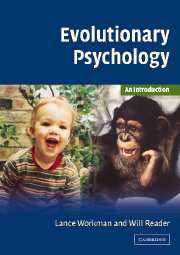Book contents
- Frontmatter
- Contents
- List of figures
- List of tables
- 1 Introduction to evolutionary psychology
- 2 Mechanisms of evolutionary change
- 3 Sexual selection
- 4 The evolution of human mate choice
- 5 Cognitive development and the innateness issue
- 6 Social development
- 7 The evolutionary psychology of social behaviour – kin relationships and conflict
- 8 The evolutionary psychology of social behaviour – reciprocity and group behaviour
- 9 Evolution, thought and cognition
- 10 The evolution of language
- 11 The evolution of emotion
- 12 Evolutionary psychopathology and Darwinian medicine
- 13 Evolutionary psychology and culture
- Glossary
- References
- Index
- References
2 - Mechanisms of evolutionary change
- Frontmatter
- Contents
- List of figures
- List of tables
- 1 Introduction to evolutionary psychology
- 2 Mechanisms of evolutionary change
- 3 Sexual selection
- 4 The evolution of human mate choice
- 5 Cognitive development and the innateness issue
- 6 Social development
- 7 The evolutionary psychology of social behaviour – kin relationships and conflict
- 8 The evolutionary psychology of social behaviour – reciprocity and group behaviour
- 9 Evolution, thought and cognition
- 10 The evolution of language
- 11 The evolution of emotion
- 12 Evolutionary psychopathology and Darwinian medicine
- 13 Evolutionary psychology and culture
- Glossary
- References
- Index
- References
Summary
Key concepts natural selection, heritable variation, reproductive success, fitness, genes, chromosomes, Mendelian genetics, genotype, phenotype, mutation, DNA, heritability of characteristics, group selection, individual selection, gene selection, altruism, the selfish gene
Darwin's ideas have had a major impact on our understanding of the relationship between evolution and behaviour. In this and the next chapter we consider in more detail the foundations that he laid for evolutionary psychology and the contributions made by subsequent evolutionists. Since much of the work on the relationship between evolution and behaviour has been conducted on non-human species we consider a number of examples from the literature on animal behaviour. No understanding of evolution would be complete without considering genetics. What exactly a gene is and what it does are introduced.
Darwin's theory of evolution
Artificial selection
The Nobel laureate Herbert Simon once argued that a cow is a man-made object. What he meant was that domestic animals such as cows, chickens and dogs have been selectively bred for features that humans can make use of. In a similar way that humans have fashioned tools and other artefacts from natural materials, so they have fashioned living organisms to fulfil their needs.
- Type
- Chapter
- Information
- Evolutionary PsychologyAn Introduction, pp. 29 - 57Publisher: Cambridge University PressPrint publication year: 2004



